AWM41 1060 - [Nurses Narratives] Sister Miss Woniarski
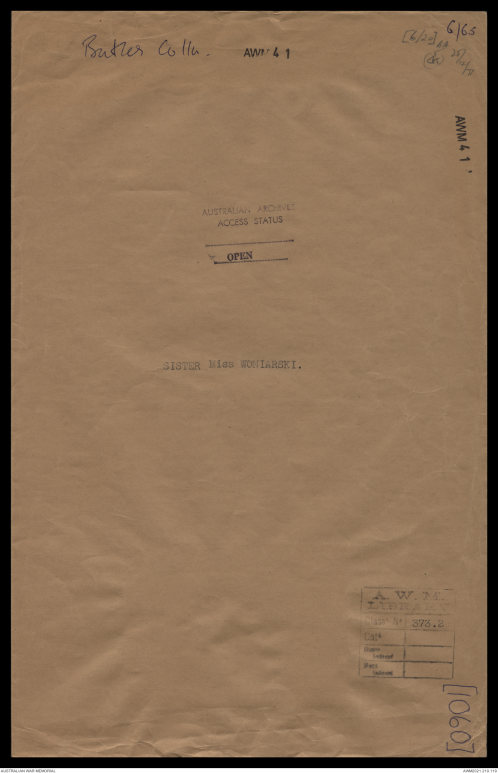
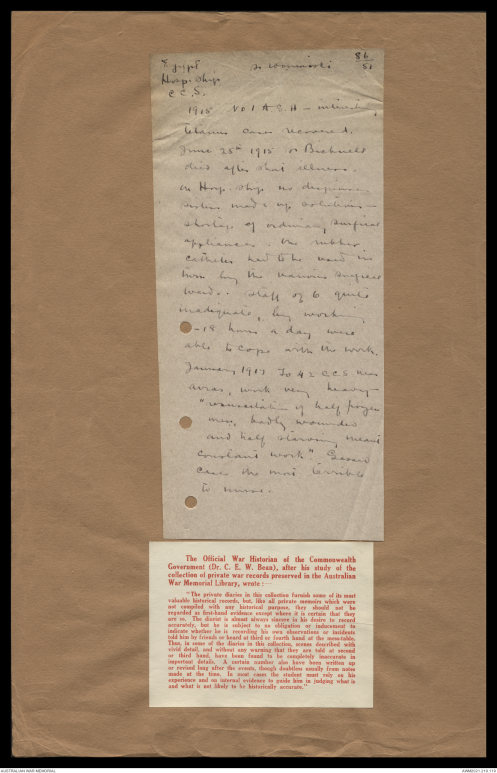
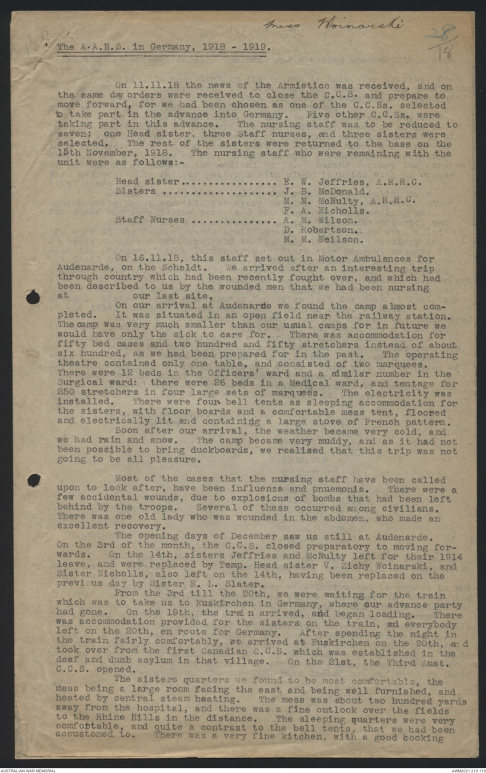
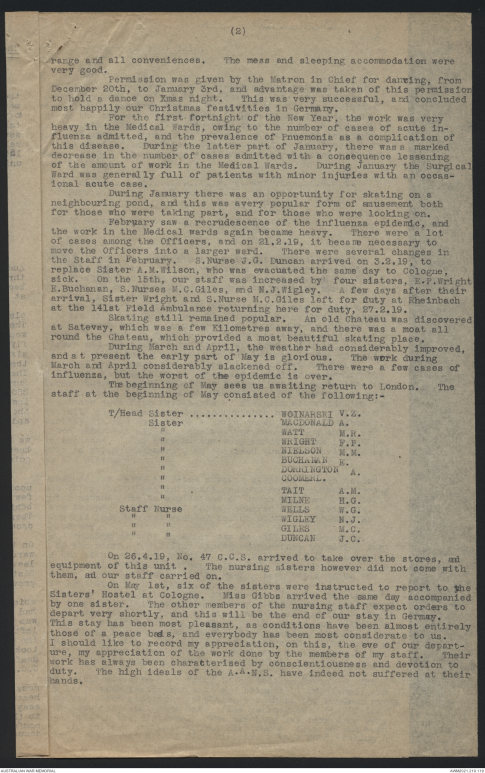
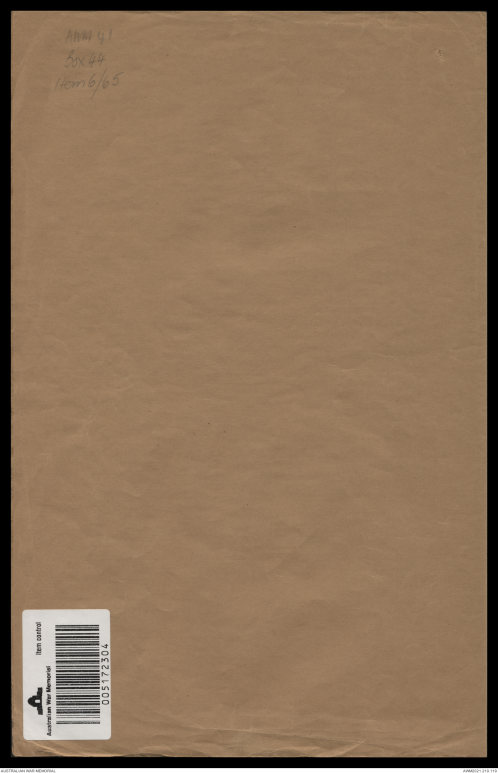
Butler Colln. AWM 41 6/65
[6/20]
BA
[[(CK)?]]
25/12/[?]
AWM 41
AUSTRALIAN ARCHIVES
ACCESS STATUS
OPEN
SISTER Miss WONIARSKI.
A.W.M.
LIBRARY
Classn No 373.2
[1060]
Egypt
Hosp. ship
C C.S.
Sr Woniarski
86/51
1915 No 1 A.G.H -interesting
tetanus cases recovered.
June 25th 1915 [?] Bicknell
died after short illness.
On Hosp. ship no dispensaries
sisters made up [?] -
shortage of ordinary surgical
appliances. One rubber
catheter had to be used in
turn by the various surgical
wards. Staff of 6 quite
inadequate, by working
- 18 hours a day were
able to cope with the work.
January 1917 To 42 CCS near
Arras, work very heavy -
"resuscitation of half frozen
men, badly wounded
and half starving meant
constant work." Gassed
cases the most terrible
to nurse.
The Official War Historian of the Commonwealth
Government (Dr. C.E.W. Bean), after his study of the
collection of private war records preserved in the Australian
War Memorial Library wrote: -
"The private diaries in this collection furnish some of its most
valuable historical records, but, like all private memoirs which were
not accepted with any historical purpose, they should not be
regarded as first-hand evidence except where it is certain that they
are so. The diarist is almost always sincere in his desire to record
accurately, but he is subject to no obligation or inducement to
indicate whether he is recording his own observations or incidents
told him by friends or heard at third or fourth hand at the mess table.
Then, in some of the diaries in this collection, cases described with
vivid detail, and without any warning that they are told at second
or third hand, have been found to be completely inaccurate in
important details. A certain number also have been written up
or revised long after the events, though doubtless usually from notes
made at the time. In most cases the student must rely on his
experience and on internal evidence to guide him in judging what is
and what is not likely to be historically accurate."
Miss Woinarski
[*28/18*]
The A.A.N.S in Germany, 1918 - 1919.
On 11.11.18 the news of the Armistice was received, and on
the same day orders were received to close the C.C.S. and prepare to
move forward, for we had been chosen as one of the C.C.Ss. selected
to take part in the advance into Germany. Five other C.C.Ss. were
taking part in this advance. The nursing staff was to be reduced to
seven; one Head sister, three Staff nurses, and three sisters were
selected. The rest of the sisters were returned to the base on the
15th November, 1918. The nursing staff who were remaining with the
unit were as follows:-
Head sister . . . . E. W. Jeffries, A.R.R.C.
sisters . . . . . . . . . J. B. McDonald.
M. M. McNulty, A.R.R.C.
F. A. Nicholls.
Staff Nurses . . . A. N. Wilson.
D. Robertson.
M. M. Neilson.
On 16.11.18, this staff set out in Motor Ambulances for
Audenarde, on the Scheldt. We arrived after an interesting trip
through country which had been recently fought over, and which had
been described to us by the wounded men that we had been nursing
at our last site.
On our arrival at Audenarde we found the camp almost completed.
It was situated in an open field near the railway station.
The camp was very much smaller than our usual camps for in future we
would have only the sick to care for. There was accommodation for
fifty bed cases and two hundred and fifty stretchers instead of about
six hundred, as we had been prepared for in the past. The operating
theatre contained only one table, and consisted of two marquees.
There were 12 beds in the Officers' ward and a similar number in the
Surgical ward: there were 26 beds in a Medical ward, and tentage for
250 stretchers in four large sets of marquees. The electricity was
installed. There were four bell tents as sleeping accommodation for
the sisters, with floor boards and a comfortable mess tent, floored
and electrically lit and containing a large stove of French pattern.
Soon after our arrival, the weather became very cold, and
we had rain and snow. The camp became very muddy, and as it had not
been possible to bring duckboards, we realised that this trip was not
going to be all pleasure.
Most of the cases that the nursing staff have been called
upon to look after, have been influenza and pnuemonia. There were a
few accidental wounds, due to explosions of bombs that had been left
behind by the troops. Several of these occurred among civilians.
There was one old lady who was wounded in the abdomen, who made an
excellent recovery.
The opening days of December saw us still at Audenarde.
On the 3rd of the month, the C.C.S. closed preparatory to moving forwards.
On the 14th, sisters Jeffries and McNulty left for their 1914
leave, and were replaced by Temp. Head sister V. Zichy Woinarski, and
Sister Nicholls, also left on the 14th, having been replaced on the
previous day by Sister E. L. Slater.
From the 3rd till the 20th, we were waiting for the train
which was to take us to Euskirchen in Germany, where our advance party
had gone. On the 19th, the train arrived, and began loading. There
was accommodation provided for the sisters on the train, and everybody
left on the 20th, en route for Germany. After spending the night in
the train fairly comfortably, we arrived at Euskirchen on the 20th, and
took over from the first Canadian C.C.S. which was established in the
deaf and dumb asylum in that village. On the 21st, the Third Aust.
C.C.S. opened.
The sisters quarters we found to be most comfortable, the
mess being a large room facing the east and being well furnished, and
heated by central steam heating. The mess was about two hundred yards
away from the hospital, and there was a fine outlook over the fields
to the Rhine Hills in the distance. The sleeping quarters were very
comfortable, and quite a contrast to the bell tents, that we had been
accustomed to. There was a very fine kitchen, with a good cooking
(2)
range and all conveniences. The mess and sleeping accommodation were
very good.
Permission was given by the Matron in Chief for dancing, from
December 20th, to January 3rd, and advantage was taken of this permission
to hold a dance on Xmas night. This was very successful, and concluded
most happily our Christmas festivities in Germany.
For the first fortnight of the New Year, the work was very
heavy in the Medical Wards, owing to the number of cases of acute influenza
admitted, and the prevalence of Pnuemonia as a complication of
this disease. During the latter part of January, there was a marked
decrease in the number of cases admitted with a consequence lessening
of the amount of work in the Medical Wards. During January the Surgical
Ward was generally full of patients with minor injuries with an occasional
acute case.
During January there was an opportunity for skating on a
neighbouring pond, and this was avery popular form of amusement both
for those who were taking part, and for those who were looking on.
February saw a recrudescence of the influenza epidemic, and
the work in the Medical wards again became heavy. There were a lot
of cases among the Officers, and on 21.2.19, it became necessary to
move the Officers into a larger ward. There were several changes in
the Staff in February. S.Nurse J.G. Duncan arrived on 3.2.19, to
replace Sister A.M.Wilson, who was evacuated the same day to Cologne,
sick. On the 15th, our staff was increased by four sisters, E.P.Wright
K.Buchanan, S.Nurses M.C.Giles, and N.J.Wigley. A few days after their
arrival, Sister Wright and S.Nurse M.C.Giles left for duty at Rheinbach
at the 141st Field Ambulance returning here for duty, 27.2.19.
Skating still remained popular. An old Chateau was discovered
at Satevay, which was a few Kilometres away, and there was a moat all
round the Chateau, which provided a most beautiful skating place.
During March and April, the weather had considerably improved,
and a t present the early part of May is glorious. The work during
March and April considerably slackened off. There were a few cases of
influenza, but the worst of the epidemic is over.
The beginning of May sees us awaiting return to London. The
staff at the beginning of May consisted of the following:-
T/Head Sister. . . . . . . . WOINARSKI V.Z
Sister MACDONALD A.
" WATT M.R.
" WRIGHT F.F.
" NIELSON M.M.
" BUCHANAN K.
" DORRINGTON A.
" COOMERD.
" TAIT A.M.
" MILNE H.G.
Staff Nurse WELLS W.G.
" " WIGLEY N.J.
" " GILES M.C.
" " DUNCAN J.C.
On 26.4.19, No. 47 C.C.S. arrived to take over the stores, and
equipment of this unit . The nursing sisters however did not come with
them, and our staff carried on.
On May 1st, six of the sisters were instructed to report to the
Sisters' Hostel at Cologne. Miss Gibbs arrived the same day accompanied
by one sister. The other members of the nursing staff expect orders to
depart very shortly, and this will be the end of our stay in Germany.
This stay has been most pleasant, as conditions have been almost entirely
those of a peace beds, and everybody has been most considerate to us.
I should like to record my appreciation, on this, the eve of our departure,
my appreciation of the work done by the members of my staff. Their
work has always been characterised by conscientiousness and devotion to
duty. The high ideals of the A.A.N.S. have indeed not suffered at their
hands.
AWM 41
Box 44
Item 6/65
Australian War Memorial
Item control
005172304
 Sam scott
Sam scottThis transcription item is now locked to you for editing. To release the lock either Save your changes or Cancel.
This lock will be automatically released after 60 minutes of inactivity.